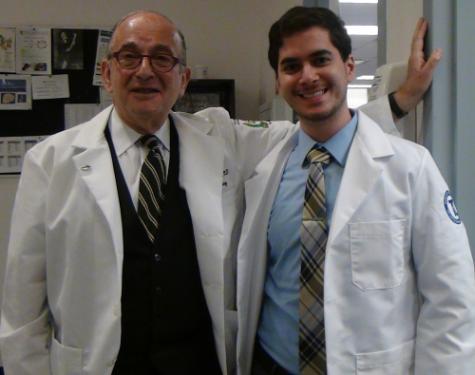From Heddesheim to Harvard, the NIH to Harlem
Dr. Robert Stern Tackles Hyaluronan

In August 2009, Robert Stern, MD, joined the faculty of Touro College of Osteopathic Medicine (TouroCOM) in Harlem as a professor of pathology.
Born to Jewish parents in a small rural town in Germany called Heddesheim (now called Guldental on the Nahe), Stern and his family immigrated to the United States in June 1938 to escape the upcoming horrors of the Second World War. His parents chose to establish their home in Seattle, Washington. At age seventeen, Stern was granted a full academic scholarship for undergraduate studies at Harvard in Cambridge, Massachusetts. He studied there for the next four years, developing an interest in medicine. He then continued his education at the University of Washington, obtained his medical degree, and then completed his residency in anatomic pathology at the National Cancer Institute/National Institute of Health (NIH). Dr. Stern worked as an NIH staff scientist for the next 12 years, studying hyaluronan biology. Also called hyaluronic acid, hyaluronan is believed to play a role in cell proliferation that contributes to the development of cancer. His period at the NIH was followed by his teaching position at the University of California in San Francisco, where he taught as a professor of pathology for the next 32 years.
Shortly after his official retirement in December 2007, while in Israel, he stumbled upon Al-Quds University in Abu-Dies, the first Palestinian School of Medicine. Discovering that there was a severe shortage of experienced professors in the East Jerusalem medical school, he was determined to help fill the need and began voluntarily teaching the entire pathology course to third-year Palestinian medical students – pro bono.
And thus, at age 73, Stern began his second career. He spent two years assisting the school, and was active on the Tumor Board of Augusta Victoria Hospital meeting weekly to discuss difficult management problems of all new referred cancer patients from Gaza and the West Bank.
Six years ago, Dr. Stern officially ended his short-lived retirement to join the faculty of TouroCOM, an experience he has termed “act three of this theater piece that is my life.” In a recent speech given in Jerusalem, he elaborated on this decision, explaining, “One can never stand still, not in life, …not professionally. I have my health, and I have energy. I feel that I have been blessed with a third life, and that I must do something special with that extra life.” He currently teaches courses in both pathology and histology at TouroCOM-Harlem and is still involved in researching the role of hyaluronan in cancer progression.
He praises the TouroCOM faculty for being “a very integrated, academic, cohesive group that works together, in collegiate spirit, to make our university a better experience for students.” He is appreciative of the small professor-student ratio at TouroCOM as well. “Every institution grows naturally, but at times, when it reaches a critical size, it loses its humanity. Here at TouroCOM, we still have our humanity. People really care what the mission of the institution is.”
And care he does. At TouroCOM, Dr. Stern is a dedicated mentor for first- and second-year students. He has published more than 250 scientific articles, many of which he has co-authored with his students. He is editor of the textbook Hyaluronan in Cancer Biology and won a 2012 Faculty Research Award for his contributions to his ongoing research in hyaluronan degradation. In fact, Dr. Stern discovered the enzyme family in the human genome that degrades hyaluronan, and he and his students are now studying hyaluronan in the brain.
In response to a question about juggling all these multiple projects, Dr. Stern is nonchalant. “You make time,” he says. “These are my kids. You look after your kids. And I plan to do that as long as I possibly can.”
Dr. Stern, who speaks English, German, Hebrew, and basic Arabic, has three children and eight grandchildren.

